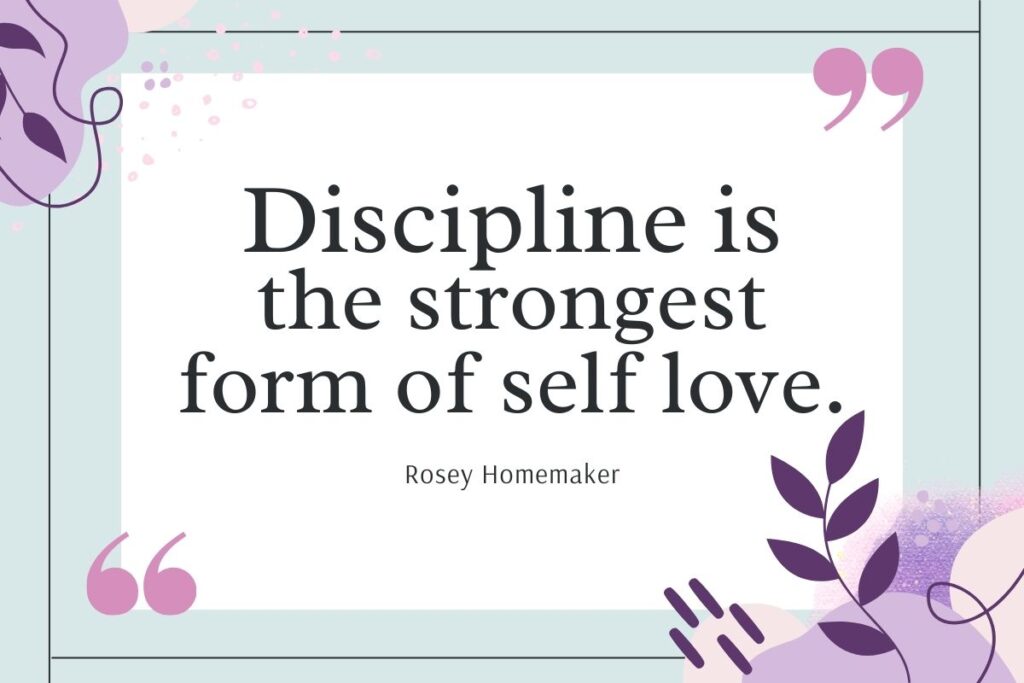Self-discipline, the cornerstone of personal growth, is the ability to regulate your thoughts, emotions, and actions to achieve your goals. It’s the difference between dreaming and doing, between wishing and achieving. While self-discipline may seem like an innate trait, it’s a skill that can be developed and nurtured with practice and dedication.
I often found myself struggling with practicing discipline when it comes to tedious tasks I always put aside for later. That later time never came and all the goals and dreams I had for myself ended up somewhere in the back of my mind, in a box called “what if”. The lesson I learned after putting down so many difficult, but necessary things I wanted to do for myself is that when we procrastinate, all we do is not love ourselves.
The best way we can show love to ourselves is by achieving discipline. Self-discipline is the only trait that will power us forward and improve our self-esteem, helping us reach our goals and dreams without exterior help. The truth is not many people want to help others become their better version.
When we were young, teachers and parents had that goal for us. But now, we as independent, autonomous adults have to make sure we always find ways to become better. Either by learning a new skill for work, prioritizing our mental health, or learning a new language. Even starting a sport class we always postponed, but secretly dreamt of.
This article that I put together for you, who seem to be struggling too as I did, has the main goal to guide you to adopt certain habits that will help you stay on track, even on top of the game, release you from that feeling of being stuck, and
Let’s see why people need self-discipline and the reasoning behind it being so difficult to obtain.
Why do you need self-discipline?

I strongly believe that “Discipline is the strongest form of self-love”. Not only we should take responsibility for our own learning, our physical and mental health, and overall well-being, but we should always seek growth opportunities, overcome challenges, and pursue that passion that we always put aside for something else, less meaningful. Self-discipline is not giving only a structure to our life, but it’s the best gift one can make to themselves.
When you stay focused and work on what you should work on, career or personal life-wise, you make sure that you will thrive in all aspects of your life and be ready to face whatever challenges you may encounter.
Moreover, by building habits that will last us forever, managing distractions, and staying on top of our game we make sure that we also give a great example to those around us. You need self-discipline for yourself, but others will follow. And self-discipline is also self-love.
Why is it that difficult to obtain?
Self-discipline is something many people praise, yet not so many conquer. Our brains are usually wired for instant gratification, succumbing to small rewards, even if they’re not in our best long-term interests. We are usually susceptible to distractions because our lives are full of them, from phones to computers and social media (let’s not even mention TikTok and any platform promoting short-form video content).
Moreover, we develop habits earlier in life, and those habits are usually difficult to break because they become automatic and make part of our lives the way we know them. These habits often lead to conflicting priorities, because we want to focus on more tasks and somehow, we fail to stay on track.
Last, but not least, the fear of failure can prevent us from taking action and pursuing our dreams. You may also be afraid of success because it may lead to taking on more responsibility and challenges that we feel we are prepared for. It is known, that nobody wants to fail at anything. The fear of failure is greater than the perceived reward we can win after changing our lifestyle.
Despite these challenges, it is possible to develop self-discipline. It’s not easy and these steps I recommend you take may sound boring, but here are a few of my tips:

7 Ways to Build Self-Discipline:
1. Start a Journal and Track Your Tasks
The first step towards building self-discipline is to take control of your time. By creating a task journal, you can track your daily responsibilities, organize your thoughts, and prioritize your commitments. Use the Urgency and Importance Matrix whenever you feel overwhelmed to distinguish between urgent and important tasks, ensuring that you focus on the critical ones first. This structured approach will help you manage your workload and time effectively.
Don’t forget to make a plan for long-term priorities as well as a strategy to make them happen.
Here are a few Printable Daily Checklist Resources.
2. Wake Up Earlier and Revise Your Journal
One of the most effective ways to boost self-discipline is to start your day with intention. This step is something I often find myself struggling with as well, so don’t beat yourself if you can’t master it at first.
Waking up an hour earlier than usual allows you to have a dedicated period of uninterrupted time (if you have children, you will understand) for planning and preparation. Before diving into your tasks, review your task journal, refine your plan, and set realistic expectations for the day ahead. This morning routine sets the tone for a productive and focused day.
3. Focus on One Task at a Time
Multitasking may seem like an efficient way to get things done, but it often leads to decreased productivity and increased stress. Instead, focus on completing one task at a time, dedicating a specific time frame for each activity. Set a realistic time limit for each task, incorporating some buffer time to account for the unforeseen. By giving your full attention to one task at a time, you can achieve greater efficiency and avoid procrastination. Which leads to the fourth step.
4. Eliminate Distractions & Don’t Procrastinate
Without a doubt, I can say that procrastination is the nemesis of self-discipline. To overcome this, identify and eliminate distractions that pull you away from your work (yes, the laundry can wait, so does cleaning the car). Put your phone away and on silence, and create a dedicated workspace free from clutter and temptation (laptops do count, but you may also need them, so just resist the urge to browse on Pinterest).
When you feel like procrastinating, remind yourself of your goals and the progress you’ve made. Visualize the positive outcomes of completing the task at hand and the satisfaction of achieving your goals. Yes, you need a strong mindset for this and it isn’t easy. But it is very rewarding, I promise you.
5. Create a Routine
Self-discipline thrives in a structured environment. Establish a consistent daily or weekly routine that includes a fixed sleep schedule, nutritious meals, regular exercise, time for working on the priorities that you have set at the first step, and time for relaxation. This routine provides a sense of stability and predictability, reducing stress and promoting mental clarity. When you have a clear structure for your day, you’re more likely to follow through on your commitments and avoid distractions.
6. Practice Self-Care
Even though sometimes you may have to delay gratification, self-discipline is not about denying yourself the pleasure of living. It is about making conscious choices that support your overall dreams and goals. By prioritizing your physical and mental health you will maintain self-discipline. So, go take that foam bath, decompress from the day, and recharge your mind and body, all this without feeling guilty.
Other self-care forms of love include: eating nutritious meals to provide your body with much-needed energy, exercising to boost your mood, applying your favorite lotions or perfume, taking your dog for a walk, rewarding with a great coffee, or even cleaning your home if that’s what makes you happy at the end of the day.
7. Celebrate Accomplishments and Share Your Success
You don’t need to hide your success. As you progress on your journey towards self-discipline, it’s important to recognize and celebrate your accomplishments. Take time to appreciate your progress, no matter how small. Reward yourself for completing tasks, reaching milestones, or overcoming challenges. No reward is too small if that will boost your mood and keep you going.
Additionally, sharing your successes with close friends and family can provide encouragement, accountability, and a sense of community. Their support and admiration can strengthen your motivation and inspire you to continue pursuing your goals.
Conclusion
Building self-discipline is a journey, not a destination. It takes time, effort, and dedication to develop the skills and habits that will allow you to achieve your SMART goals. By implementing the strategies outlined in this blog post, you can start to take control of your life and create the future you desire.
Remember, self-discipline is not about being perfect; it’s about making conscious choices that align with your values and aspirations. Embrace the process, celebrate your progress, and never give up on your dreams.






Pingback: The Only 30-Day Self-Care Challenge You’ll Ever Need